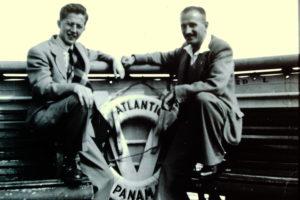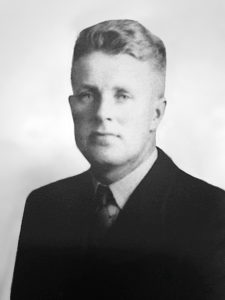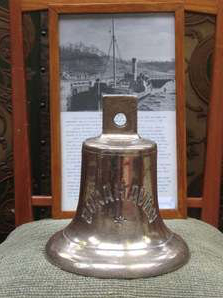At around five o’clock on the afternoon of October 26, 1953, the merchant ship Islandmagee set sail from the port of Birkhill, Scotland bound for the Port of Leith, also in Scotland. Her cargo that day was approximately 200 tons of wet sand. As often happens in the North Sea, a storm gale came up that quickly turned into a force 9 storm, with strong winds and high waves. On board the ship was a crew of six. One of those men was my grandfather, James Rendall.
That same fall, my father had made the long trip by ship from his home in Leith, Scotland to attend college at what is now Prairie College in Three Hills, Alberta, Canada. Taking the train from Edinburgh, Scotland to South Hampton, England, he set sail on an Italian liner across the Atlantic, landing in Montreal. Having been at sea for six days, he then made his way by train another five days over 2200 miles, to the little town of Three Hills in the middle of the prairies. The setting could not have been more different from the culture and topography that he had left behind in Scotland. Enrolling that September, he took to his studies with vigour and quickly became one of the top students to have attended the school.

The author’s father, T.S. Rendall (left) with his friend George Bethune on the ship from South Hampton to Montreal.
In November of 1976, I was 15 years old. One particular day I was glued to my little AM radio, as I often was, surfing the airwaves for anything that would catch my ear. The haunting strains of an electric guitar, a steel guitar and an acoustic 12 string guitar soared across the airwaves. After the distinctive introduction, the iconic voice of Gordon Lightfoot began to sing: “The legend lives on from the Chippewa on down . . .” I was hooked! I had never heard anything that sounded remotely like this, and as the song unfolded I realized that it was a “story song”. It told the tragic tale of the bulk carrier called the SS Edmund Fitzgerald, which sank in Lake Superior while hauling iron ore from Duluth, Minnesota to Detroit, Michigan on November 10, 1975. Twenty-nine men lost their lives that night in an awful storm. When launched on June 7, 1958, the SS Edmund Fitzgerald was the largest ship on North America’s Great Lakes, and she remains the largest to have sunk there. While Lightfoot certainly took some artistic license in the telling of those events, he captured the essence of the horror in a very real way. When he sings at the end of the song “The church bell chimed till it rang twenty-nine times”, you can almost feel the hushed reverence and solemnity that surely was present that day.
As I often did when I made a new discovery or was excited about something, I went to find my Dad. I told him that I had just discovered a new song on the radio that I thought he would like, and that I would play it for him the next time it came on. I knew Dad loved ships and the sea and I thought this would be right up his alley. Always trying to support my endeavours, Dad said that would be just fine and to let him know when the song played again.
A couple of hours later the song came on, and I rushed upstairs from my little basement studio/shop to find Dad sitting in his chair. He was probably studying or marking papers, his normal activity on any given evening in our home. Turning up the song, I looked at Dad expectantly for his affirmation of what a truly great song this was, and what great taste I had!
Dad began to look agitated, and even irritated, as the song played on. Now The Wreck of the Edmund Fitzgerald did not follow the typical pop formula of a three-minute song. It actually clocks in at six minutes and 40 seconds. As we sat in the living room for those long painful minutes, the atmosphere grew more and more awkward. Finally the song came to an end, and Dad said, in maybe the most serious tone of voice I had ever heard him speak, “Son, NEVER play me that song again!”
I was shocked and confused. Was the song too ‘rock ‘n roll’? Was there an offensive lyric that I hadn’t caught? Then, to my youthful, naive self, a little light went on. It finally computed, and I felt absolutely horrible.
You see, on that fateful day of October 26, 1953, the Islandmagee took on water and sank, taking with her the entire crew – including my Dad’s father, gone at the age of only 52. There was compelling evidence that at least some of the crew had made it into one of the life boats, but it sank as well. All the crew except my grandfather were washed up on the coast of Fife, still wearing their life jackets. The hypothesis is that my grandfather rushed to launch the lifeboat which would have been tied down on deck, as his leather knife holder was found later in the lifeboat, floating on the sea. He did not have time to put on a life jacket.
In what the papers referred to as a “double tragedy”, the rescue ship named the Arbroath, which was dispatched to the scene after being alerted by rocket flares and calls of mayday on the radio, also went down into the dark abyss. All but one of her crew perished as well. A court inquiry held in February of 1955 found (and I quote): “The Court is therefore of the opinion that the evidence does not disclose that the casualty to “Islandmagee” was caused, or contributed to, by the fault or default of any person or persons.” The insurance companies like to call it “an act of God” – in simple terms, it was down to Mother Nature, and that night in the North Sea, she was a harsh mistress.
The next day, October 27, 1953, my Dad received a telegram from his older brother Gavin with the cryptic message, “Father lost at sea ~ Gavin”. Dad had no money to make his way back to Scotland for the funeral and to be with his family, as he had spent every penny he had to emigrate to Canada to attend school. In many ways he grieved alone. He was barely twenty years old.
In today’s vernacular, psychologists and counselors use the term “trigger”; a word used to describe sensations, images or experiences that give rise to a traumatic memory. This term is often used in relation to Post-Traumatic Stress Disorder (PTSD), of which there is an increasing awareness. But back in 1976, I had never heard of the word “trigger” – other than my experiences with target shooting or in reference to the palomino horse ridden by Roy Rogers in the movies. It was not until the song had ended and Dad had made his proclamation that I realized what had happened. When I was growing up, Dad hardly ever spoke about his father and the pain of his loss. He had found ways to cope. But Gordon Lightfoot’s song and its graphic retelling of the tragedy of the Edmund Fitzgerald was just way too close to home for him. Twenty three years later, the event was still raw.
Now while I might be forgiven for my lack of sensitivity, given my age and naiveté, I realized then, maybe for the first time, something of the pain Dad carried from losing his father at such a young age. I had no intention of hurting my father, but I just hadn’t connected the dots.
I learned an important lesson that day, one I have always tried to keep in the back of my mind. The poet Miller Williams (1930-2015) summed it up very well in his poem Compassion:
Have compassion for everyone you meet,
even if they don’t want it. What seems conceit,
bad manners, or cynicism is always a sign
of things no ears have heard, no eyes have seen.
You do not know what wars are going on
down there where the spirit meets the bone.
THE WRECK OF THE EDMUND FITZGERALD
Gordon Lightfoot
LYRICS:
The legend lives on from the Chippewa on down
Of the big lake they called ‘Gitche Gumee’.
The lake, it is said, never gives up her dead
When the skies of November turn gloomy.
With a load of iron ore twenty-six thousand tons more
Than the Edmund Fitzgerald weighed empty
That good ship and crew was a bone to be chewed
When the gales of November came early.
The ship was the pride of the American side
Coming back from some mill in Wisconsin.
As the big freighters go, it was bigger than most
With a crew and good captain well seasoned,
Concluding some terms with a couple of steel firms
When they left fully loaded for Cleveland.
And later that night when the ship’s bell rang
Could it be the north wind they’d been feelin’?
The wind in the wires made a tattle-tale sound
And a wave broke over the railing,
And every man knew, as the captain did too,
T’was the witch of November come stealin’.
The dawn came late and the breakfast had to wait
When the gales of November came slashin’.
When afternoon came it was freezin’ rain
In the face of a hurricane west wind.
When suppertime came, the old cook came on deck sayin’
Fellas, it’s too rough to feed ya.
At seven pm a main hatchway caved in, he said
Fellas, it’s been good t’know ya.
The captain wired in he had water comin’ in
And the good ship and crew was in peril.
And later that night when his lights went outta sight
Came the wreck of the Edmund Fitzgerald.
Does any one know where the love of God goes
When the waves turn the minutes to hours?
The searches all say they’d have made Whitefish Bay
If they’d put fifteen more miles behind her.
They might have split up or they might have capsized.
They may have broke deep and took water.
And all that remains is the faces and the names
Of the wives and the sons and the daughters.
Lake Huron rolls, Superior sings
In the rooms of her ice-water mansion.
Old Michigan steams like a young man’s dreams;
The islands and bays are for sportsmen.
And farther below Lake Ontario
Takes in what Lake Erie can send her.
And the iron boats go as the mariners all know
With the gales of November remembered.
In a musty old hall in Detroit they prayed,
In the maritime sailors’ cathedral.
The church bell chimed till it rang twenty-nine times
For each man on the Edmund Fitzgerald.
The legend lives on from the Chippewa on down
Of the big lake they call ‘Gitche Gumee.
Superior, they say, never gives up her dead
When the gales of November come early.
The Wreck of the Edmund Fitzgerald
Lyrics © Moose Music Ltd. / Early Morning Music Ltd.









